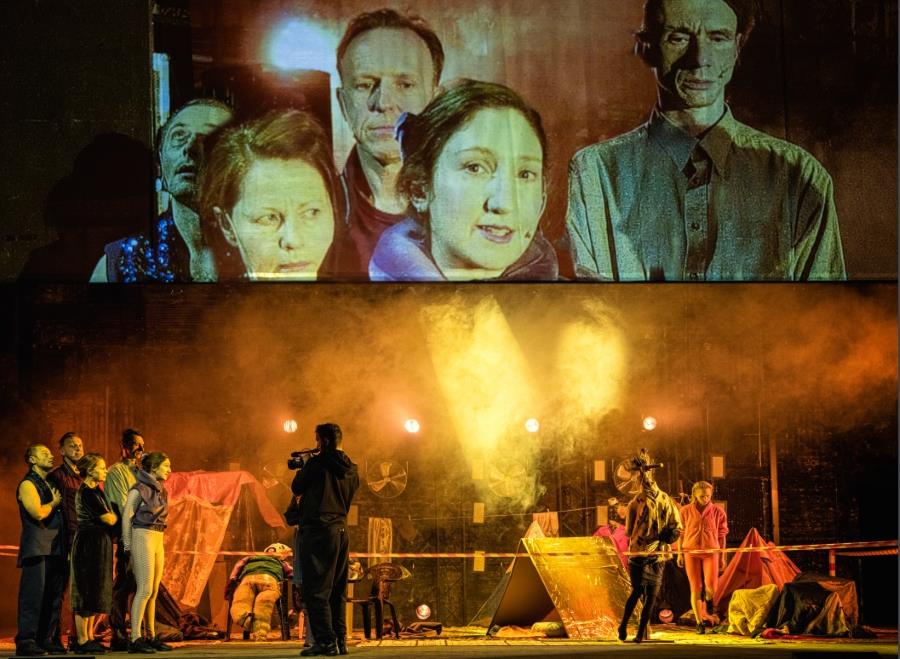In Kraków, it’s as if Bertolt Brecht never said goodbye. In the city’s glittering, 131-year-old Słowacki Theatre, a jewel-box UNESCO World Heritage site, director Jakub Skrzywanek is staging his own anti-capitalist “anti-opera,” Man of Paper, a delightfully savage evisceration of a rapacious Polish housing market—the kind of target Americans can relate to all too well.
This raucously satirical bit of agitprop set to music is a bold centerpiece of Kraków’s Divine Comedy theatre festival, which brings together 20 productions from all over Poland. I and more than a dozen others in a U.S. delegation, headed by Center for International Development leaders Howard Shalwitz and Brandice Thompson, are trundling across this gorgeous city from one English-surtitled show to the next.
Prompted by what the musical asserts was the eviction of Roma immigrants in the city of Wrocław to make way for a new housing development, Man of Paper arrives at a fascinating transitional moment in Polish politics—politics being an omnipresent value in theatre here.
Last December, hope was rekindled when a more liberal national government replaced the right-wing party that had ruled for eight years, a tenure that devastated theatre in a country that depends heavily on public subsidy. (Bartosz Szydłowski, Divine Comedy’s director, said that the grant for this year’s festival was a tenfold increase over 2023.)
“The last few years, we were gathering to survive, and now we’re gathering to flourish,” said Olga Brzezińska, deputy director of the Adam Mickiewicz Institute, the state agency for cultural promotion. At a reception Tuesday for visiting artists and journalists held in the city’s Museum of Contemporary Art, I pulled her aside for her perspective on the suddenly divergent arts scenes of a hopeful Poland and an anxious U.S., where politics have taken an ominous turn.
“It’s deeply embedded in the Polish nature to be disappointed, quickly,” Brzezińska said, referencing Poland’s tortured history. Which is why the new optimism is rapidly advancing the institute’s agenda of highlighting Polish theatre internationally. Next April, for example, Polish director Lukasz Twarkowski brings his well-received play The Employees to NYU’s Skirball Center. “The focus should be on the arts,” Brzezińska insisted, regarding Poland’s outreach to the world. “Because politics will always disappoint you.”
Nevertheless, Polish theatre remains resolutely at the intersection of art and politics, as Man of Paper scathingly trumpets. I first encountered Skzrywanek at the festival two years ago, when he staged The Death of John Paul II, an anguishing, hyper-realistic dramatization of the pope’s painful, bedridden final days, and an unfiltered call for saner attitudes about euthanasia.
In Man of Paper, a bulldozer rolls onto Agata Skwarczyńska’s sprawling set of a Roma encampment and destroys the makeshift shelters. (To underline their dehumanizing treatment, the Roma are played by primitively designed puppets.) In true Brechtian fashion, an anarchic “anti-opera” unfolds with a bubbly emcee setting the ironic tone. “We’re in the theatre, the temple of art!” he declares. “Let’s sing showtunes!”

The emcee’s ultra-sweetness informs a certain sourness in the Polish artistic psyche: The smiles you see painted on actors’ faces mask more sinister realities. The idea of a narrative with darker forebodings is also apparent a 10-minute walk from the Słowacki, where, in the Stary Theatre complex, one can find an intriguing adaptation of an erotic Polish novel from 1908, The Story of Sin.
Here, the dramatic conversion is of a pulpy story, often derided as quasi-pornographic, that in 1975 was turned into a popular, explicit Polish film. It has now been reimagined as a modern feminist fable by director Wojtek Rodak.
An overly detailed first act plunges us into the melodrama of the pleasure-seeking Ewa—well played over the course of three hours by three different actresses—who kills the newborn from one of her affairs. (The play dwells for too long in a sendup of the comically histrionic relationship of young Ewa and her initial lover.)
Only in the brisker, sharper Act Two does Rodak and company’s intention become clearer. We’re transported to a movie set and an account of the alleged off-camera brutality inflicted on a film actress playing Ewa. The consequences and tension suddenly feel accessible; the artificial portrayals of carnality become backdrops for the authentic suffering of women compelled to act them out.
These tantalizing offerings compelled me to ponder how well theatre back home would be served by regular exposure to the work from countries like Poland. Festivals like this one provoke their own brands of shock and awe: It’s endlessly invigorating to consider how disparate theatre cultures can enrich each other. And how much an inveterate theatregoer still can learn.
Peter Marks (he/him) was the Washington Post theatre critic for 21 years.
Support American Theatre: a just and thriving theatre ecology begins with information for all. Please join us in this mission by joining TCG, which entitles you to copies of our quarterly print magazine and helps support a long legacy of quality nonprofit arts journalism.


